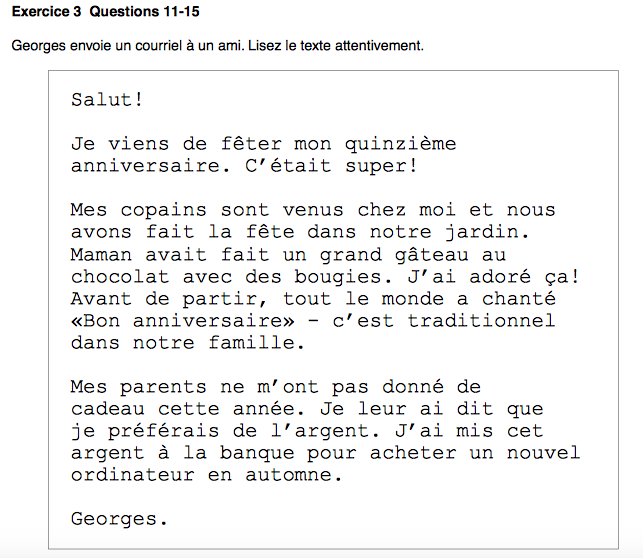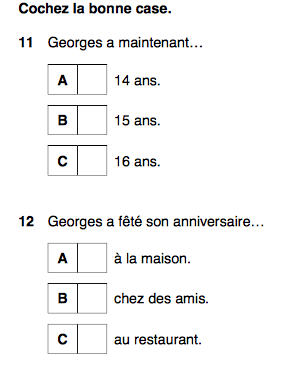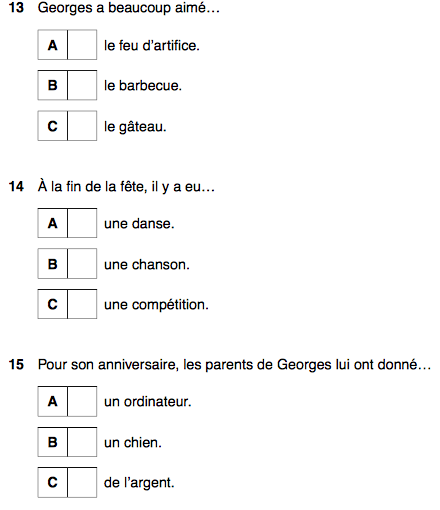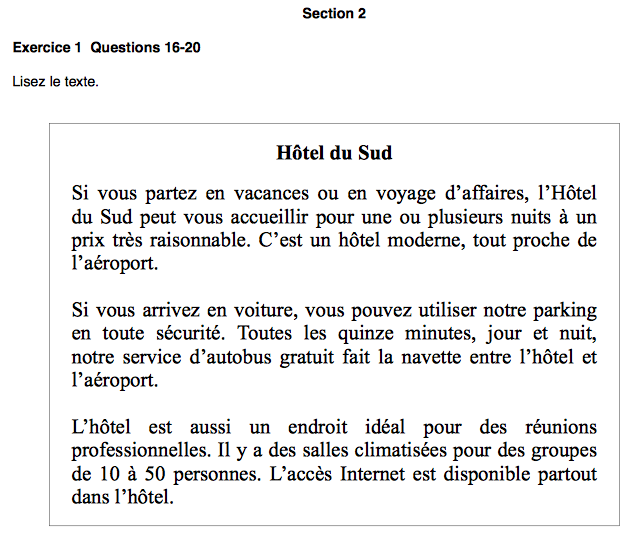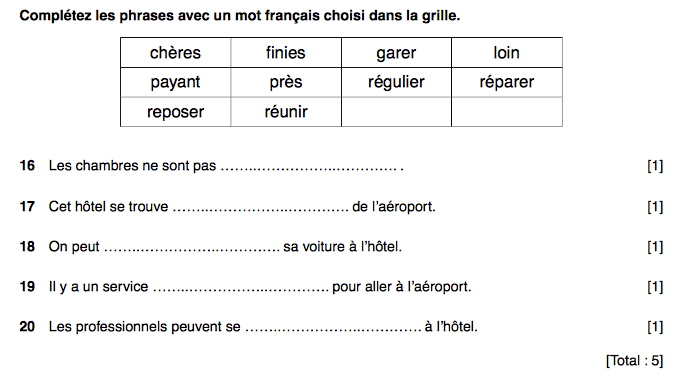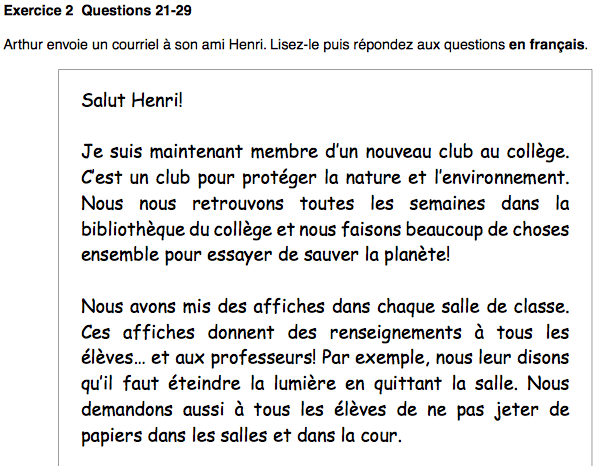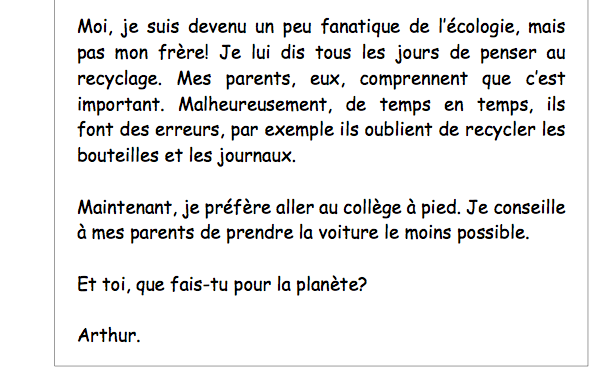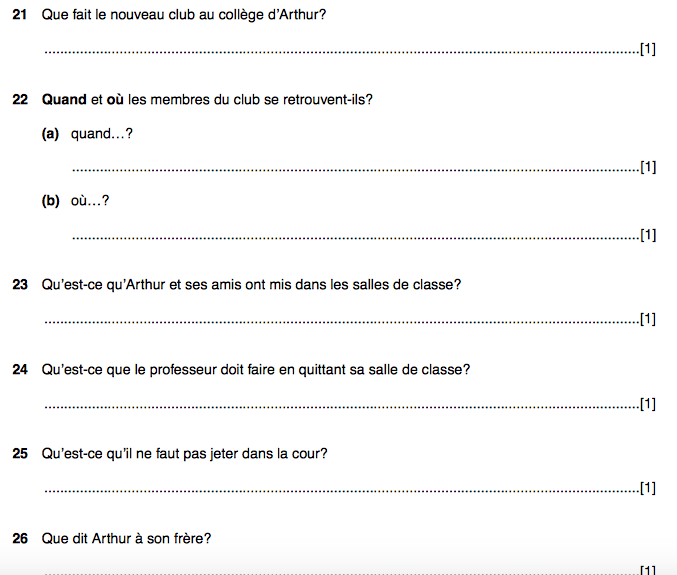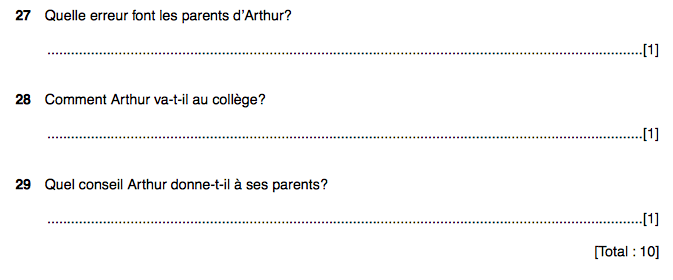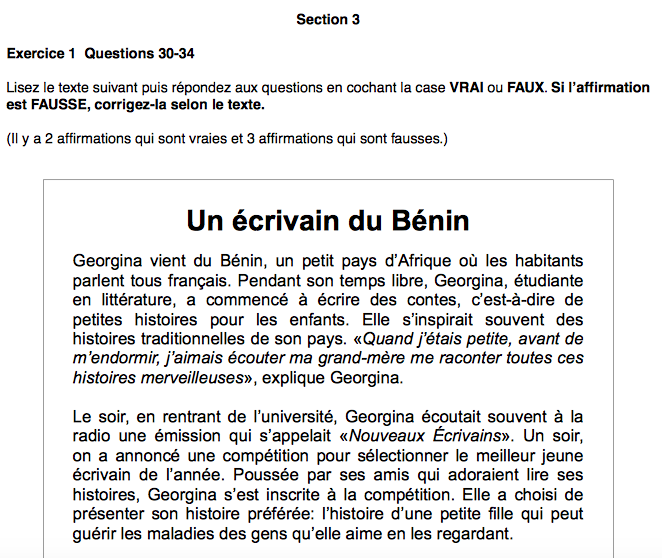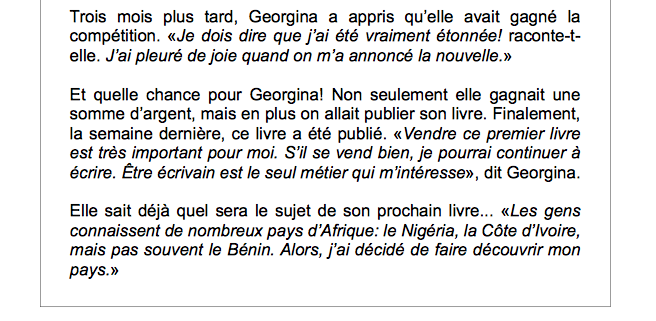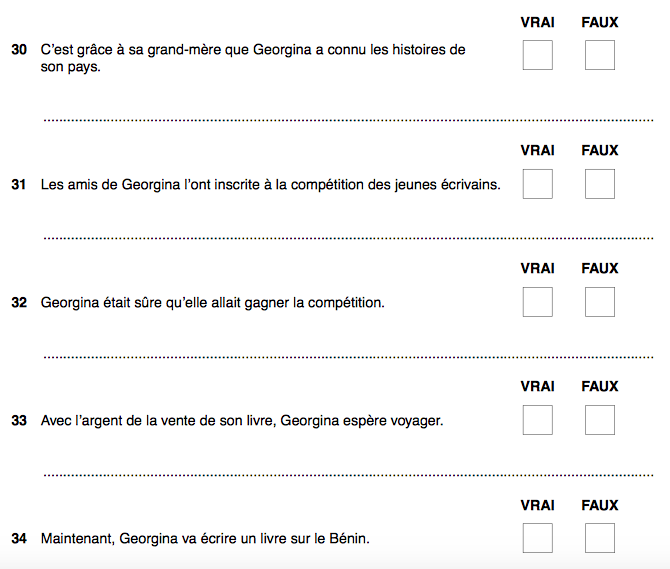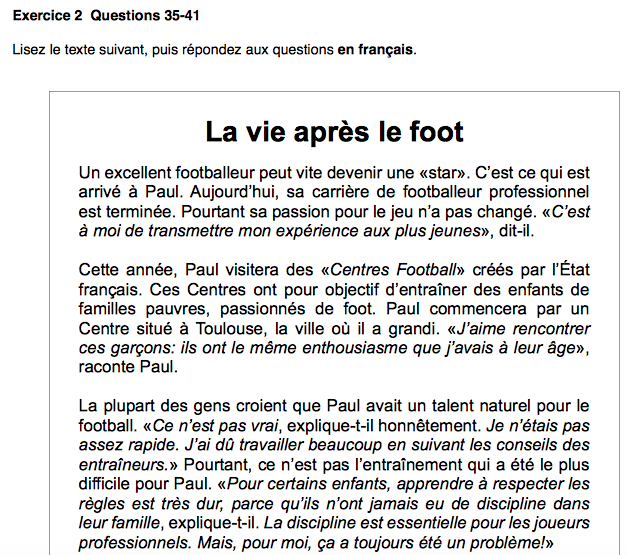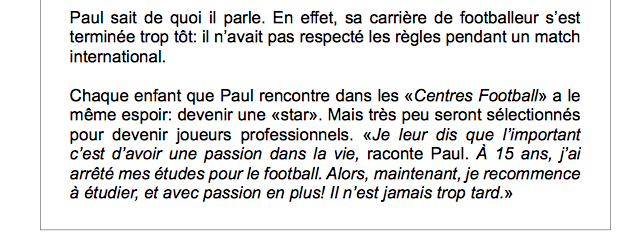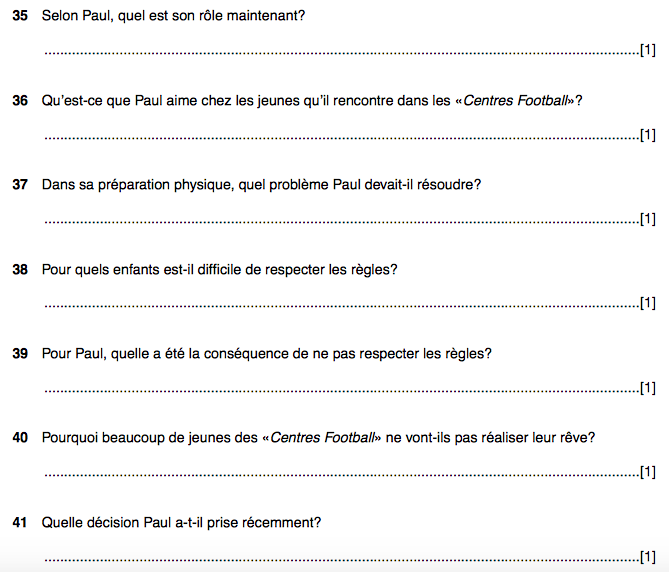IGCSE Page > IGCSE Revision
IGCSE Paper 2 : READING
- The paper consists of 3 sections:
- The paper consists of 3 sections:
|
Duration of paper: 1 hour
Section 1: Factual (tick the boxes). Click here for examples. Section 2: Two texts (one short, one long). Factual material, simple attitudes & opinions. Section 3: Two texts (longer, more complex). Agreement/disagreement, complaints, attitudes, emotions, ideas |
Booklet of Tips, exam technique and key vocabulary
Annotated Reading Paper: click here
Essential vocabulary that appeared in Past papers - Click here
|
|
- Section 1: Factual information
> Useful topics to revise (also useful for the section 1 of the Listening Paper) Food & drinks
House chores Shops in towns + things on the road (traffic lights, signs,etc) House appliances Eating out Services in stations / airports Shopping items
Clothes & accessories Hobbies& activities Jobs Outdoor visits & weather Pains & injuries Times and prices
The last exercise
of Section 1 tests your understanding of synonyms or phrases which means the
same (examples: avoir un rendez-vous / voir quelqu’un; travailler / étudier,
etc)
- Section 2:
Tasks: 1. Short text: gap filling exercise Tips: Your knowledge of grammar will be very useful in this exercise: - pay attention to masculine/feminine in order to match the correct noun with the correct article / adjective - pay attention to singular/plural verbs in order to match the correct verb with the correct subject - look out for expressions with prepositions such as beaucoup de / assez de / peu de, etc - be aware of when abbreviations are needed in front of a vowel (qu' / d' / l' ) 2. Long text – usually a letter: questions to answer in French. The question may look complex, but the answer required is always factual and simple! You may lift a whole sentence from the text for your answer (but you may not do that in Section 3). Revise: >> vocabulary of local tourism (trips & excursions, renting of equipment, shops, etc) >> vocabulary of relationships : s’entendre avec, se disputer, embêter, mettre en colère, s’énerver, supporter, autoriser, interdire, etc >> High-Frequency verbs >> prepositions: avant/après, partout... - Section 3:
Tasks: Text 1: say whether statements are true/false and correct the false ones, in French There are 2 correct statements and 3 incorrect ones. Only the incorrect ones require a correction. You cannot simply negate the statement as a correction, but you may lift off the relevant sentence from the text. Text 2: answer questions in French. You cannot lift off whole sentences from the text. You have to select carefully the element for your answer. Tips:
> Section 3 often presents "Life stories" (the story of someone who went on a life-changing trip for ex.). Pay particular attention to the different tenses used (to be sure of what the people used to do, did, are doing now, or are intending to do in the future). Revise modal verbs (devoir, falloir, pouvoir) in past and future tenses (il fallait…, il a dû…, etc) to make sure you understand the subtlety of some of the questions > Never leave any blanks > Do not lift too much off the text, just what you need > Read the question carefully to ensure you select the appropriate detail and include all the elements needed to answer or justify. Sometimes, you will need two elements for a correct answer. > Drop the connective words (mais, poutant, ou, etc) and the relative pronouns (qui/que) at the beginning of your answers > Drop the "dit-elle", "se souvient …", "raconte-t-il", etc (generally in the middle or at the end of direct speech quotes) > In order to understand the subtlety of the questions, pay particular attention to the following : -quantities : trop, pas assez, autant, plus de, moins de, au moins, au minimum etc -sequence of events : avant, après, en conséquence, en même temps, l’année d’avant, l’année d’après, etc |
Learn the meaning of these typical questions: Section 2 :
Pourquoi… ? =Why… ? Combien… ? = How much/many… ? Où… ? =Where… ? Quand… ? =When… ? Avec qui… ? =Who…with ? Quel est le nom de… ? = What… is called ? Quel travail… ? =What/which job… ? Qu’est-ce qui / Qu’est-ce que ...? = What...? Depuis combien de temps… ? = Since when… ? Pour combien de temps… ? = For how long… ? Comment est le nouveau… ? = What is the new…like ? Selon/pour…, pourquoi… ? = According to…, why… ? Que pense…/ Que fait… ?/Que veut… ? =What does he/she think/do/want… ? De quoi a-t-il eu envie ? = What did he want ? Qu’a-t-il décidé de faire ? = What did he decide to do ? Qu’est-ce qu’il a essayé de faire ? = What did he try to do? Pourquoi pensait-on que… ? = Why did people think that… ? Pourquoi était-elle déçue ? = Why was she disappointed ? Que faisait-il quand… ? = What was he doing when… ? Qu’est-ce qui est le plus important pour… ? = What matters the most for… ? Qu’est-ce qui est nécessaire pour… ? = What is necessary for… ? Que dit-il au sujet de… ? = What does he say about… ? Qu’est-ce qui fait mal à… ? = What hurts… ? |
|
Section 3:
Qu’est-ce qui montre que… est un succés/un échec ? Quelle réaction… ? Quel sentiment… ? Qu’est-ce qui a décidé… à +vb ? Quelles sont les raisons de … ? De quoi a-t-il besoin ? Quelle solution a-t-il trouvée ? Quelle décision a-t-il prise ? Quelles sortes de difficultés… ? Pourquoi pensait-il que… ? En quoi la transformation… ? Quel rôle a joué… ? Quelle est la condition pour… ? Qu’est-ce qui a changé …. ? Pourquoi est-elle différente de… ? Qu’est-ce qu’elle a le plus aimé ? Qu’est-ce qui a été le plus difficile ? De quoi a-t-il besoin pour… ? En quoi…va-t-il aider…à … ? D’après… ? Comment fait-elle pour… ? A quel endroit se passe… ? Comment a-t-il été possible de… ? Pourquoi compare-t-on… à… ? Quelles sont les critiques faites par… ? |
= What shows that... is a success/a failure? = What reaction...? (how somebody reacted) = What feeling...? (how somebody feels/felt) = What made somebody do something >> motive/reason = What are the reasons for...? = What does he need ? = What solution did he find? = What decision did he make? = What sort of difficulties...? = Why did he think that...? (thoughts) = How did the transformation...? (something about change) = What role did...play? (the role a person/an event played, the influence of sthg) = What is the condition for...? (condition for sthg to happen) = What changed...? (something about change, evolution, differences, etc) = Why is she different from...? (generally, a difference in attitude/beliefs, etc) = What did she like the most? = What was the hardest? = What does he need in order to...? = How will... help to...? (something/someone being helpful) = According to... = How does she manage to...? = Where is...taking place? = How was it possible to...? = Why do people compare...to...? = What is the criticism made by...? |
Topics that came up in Past Papers:
|
Date:
Nov 2002: Nov 2003: June 2003: Nov 2004: June 2004: Nov 2005: June 2005: Nov 2006: June 2006: Nov 2007: June 2007: Nov 2008: June 2008: Nov 2009: June 2009: Nov 2010: Nov 2011: Nov 2012: May 2012 May 2013 Nov 2013 May 2014 Nov 2014 NEW SPECS May 2015 |
Section 1:
School trip; relationships Leisure Festivals; Eating Festivals; Pets Festivals; Careers Local tourism; Food Special occasion; Hols Special occasion; Leisure Festival; Leisure Holidays; Food Tourism; School Local tourism; Careers School; Health Local tourism; Holidays Leisure; Home life Home life; Health (2.2) School trip Holidays **************************** |
Section 2:
Careers Relationships School Relationships Travel Family Holidays Leisure Health Special occasion Holidays Holidays School Relationships Family Special occasion; Hols (2.2) Relationships, Special occasions (2.2) Home life (2.1), Hols (2.2), Sch.trip (2.3) House (2.3), Hols (2.1) Home life (2.3), celebrations (2.2) Home life (2.2), Relationships (2.3) Hols (2.3)(2.2), Relationships (2.1) Work expce (2.1)(2.3), Shopping (2.2) ****************************************** Hols, Tourism (2.3)(2.1), Envt (2.2) |
; Section 3:
Special occasion; World issues Sports; Contemporary issues Contemporary & World issues Sports; Travel World issues Careers; World issues Health; Careers Contemporary issues; Town Travel; Contemporary issues Sports; Health Travel; Careers Sports; Contemporary issues Travel Careers; Health Transport Health; Careers; Careers (2.2); School (2.2); World issues/Envt (2.3) Health; Leisure Hols (2.1); Places/Customs (2.1), World (2.2), Careers (2.2), Envt (2.3) Sports (2.3), Cont. issues (pollution)(2.3), World issues (2.1) Sports (2.3), Relationships (2.2), Cont. issues (Old age) (2.1) Environment (2.1), Cont. issues (Disabled) (2.1), Higher Ed (2.2), House (2.3) Hobbies (2.2), Careers (2.1) Careers (2.1), School (2.3) **************************************************************************************** Careers (2.3)(2.1), Sports (2.2), Festivals (2.1) |
June 2015 (Paper 2-2)

